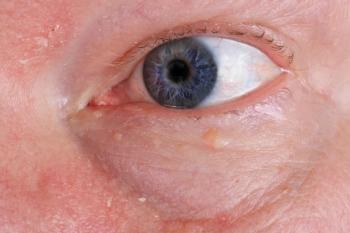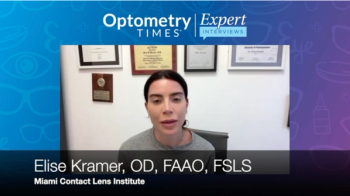
AOA 2023: Eyechiatry: The psychology of vision loss
Mohammad Rafieetary, OD, FAAO, shares brief highlights from his 2023 AOA presentation, "Do you practice Eyechiatry? The psychology of vision loss," which he co-presented with Roya Attar, OD, MBA.
Mohammad Rafieetary, OD, FAAO, sat down with Optometry Times®' assistant managing editor Emily Kaiser to give a brief overview of his presentation, "Do you practice Eyechiatry? The psychology of vision loss," which he co-presented with Roya Attar, OD, MBA, during the 2023 AOA Optometry's Meeting in Washington, DC.
Video transcript
Emily Kaiser, Assistant Managing Editor:
Hi everyone, I'm Emily Kaiser with Optometry Times and I'm sitting down with Dr. Mohammad Rafieetary, who is presenting a course entitled, "Do you practice Eyechiatry? The psychology of vision loss," at Optometry's Meeting which is hosted by the AOA in Washington DC. Welcome Dr. Rafieetary, thanks for taking the time to talk to us.
Mohammad Rafieetary, OD, FAAO:
Thank you, Emily, good to be here, as always, talking to you about these presentations and lectures.
Happy to have you. So first, can you give us a brief overview of your course?
Kaiser:
Happy to have you. So first, can you give us a brief overview of your course?
Rafieetary:
So this course is going to be presented on Saturday, and it's pleasure, that I'm co-presenting with my esteemed colleague and friend, Dr. Roya Attar, which she practices at the University of Mississippi Medical Center, Department of Ophthalmology. "Eyechiatry" is a word that actually I have trademark and I coined, because as eye care providers, beyond dealing with the patient's diagnosis of the problems they have, we have to do a lot of counseling and education and understand what the patients tell us. You know, 3 patients can have the same conditions, same circumstances, but their perception and their presentation is totally different from one to the other. Furthermore, patients present to us at every spectrum of disease—I'm in the retina ward, and patients who have macular degeneration can come at the earliest, or the latest stage. Some know what they have some don't know what they have. I mean, it's hard to navigate all this stuff. And we have to explain to the patients their condition, we have to understand what they're telling us, and then we have to make sure they understand what we are telling them. Sometimes I tell patients, "I'm responsible for what I tell you, what I'm talking about. I'm not responsible for what you hear." Part of that is the disconnect between us and the patients telling them the stuff that they may not understand. We have this canned patient education, stuff and comments, but a lot of times we have to sort of deviate from that and tailor our conversation to patients based on their understanding, their situations. Just imagine this, a lot of patients who have age-related macular degeneration, this hot topic, geographic atrophy, also have different stages of dementia, Alzheimer's, other comorbidities. Do we keep that in consideration talking to the patients about their conditions? So all of this stuff is eyechiatry. I hope to be able to provide a new science beyond eye care. In fact, I want to open a college of eyechiatrists.
Kaiser:
That would be really fascinating. That sounds like a really important topic and a really good discussion to be having with eye care providers everywhere.
Rafieetary:
Looking forward to seeing everybody at DC, hopefully folks can come and enjoy the whole meeting and be able to attend the eyechiatry lecture.
Yeah, I hope so. It sounds really important. So thank you so much and see you in DC.
Kaiser:
Yeah, I hope so. It sounds really important. So thank you so much and see you in DC.
Newsletter
Want more insights like this? Subscribe to Optometry Times and get clinical pearls and practice tips delivered straight to your inbox.













































